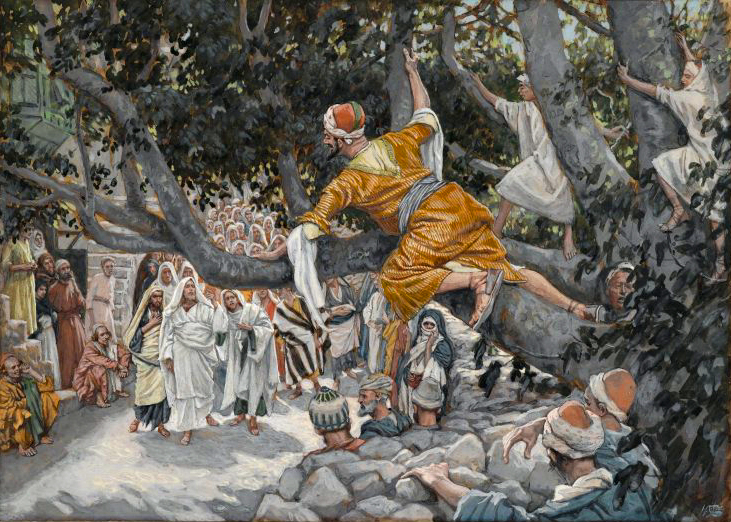31st Sunday of the Year C (31 Oct 2010)
Wis 11. 22-12. 2; Ps 145; 2Th 1. 11-2 .2; Lk 19. 1-10
Homily of Fr. Paul Panaretos, S.J.
Priesthood. . .
. . .I will guess you are thinking of ordained priesthood. After all, this weekend the church in the United States prays for priests present and future. I appreciate your prayers and your many kindnesses. Yet, if you and others did not exercise your vocations, I and other priests would not have our ministry. I want to reflect with you on our relationship to priesthood.
Baptism into Jesus is the primary sacrament because all the channels of divine life flow from it. Baptism begins our transformation to be more like Jesus. We become a “new creation” by Jesus’ Spirit as the Second Vatican Council affirmed.
Christ made His brothers [and sisters], called together from all nations, mystically the components of His own Body. In that Body the life of Christ is poured into the believers who, through the sacraments, are united in a hidden and real way to Christ who suffered and was glorified. Through Baptism we are formed in the likeness of Christ: “For in one Spirit we were all baptized into one body.’1
 What does “formed in the likeness of Christ” mean? Consider with me how we use the word people. We may mean all humans in the world; or we may mean all humans of a nation; or we may mean the humans in this neighborhood but not another neighborhood. Jesus’ ancestors and contemporaries saw themselves as belonging to God in a way unlike others. They knew God created all people, and they saw that they shared a unique relationship with God and through God with each other. One of the phrases they used to signal their unique relationship was descendants of Abraham, which we heard Jesus use in the singular when he invited Zacchaeus. That is a move from all people to a group of people. It isn’t the only move.
What does “formed in the likeness of Christ” mean? Consider with me how we use the word people. We may mean all humans in the world; or we may mean all humans of a nation; or we may mean the humans in this neighborhood but not another neighborhood. Jesus’ ancestors and contemporaries saw themselves as belonging to God in a way unlike others. They knew God created all people, and they saw that they shared a unique relationship with God and through God with each other. One of the phrases they used to signal their unique relationship was descendants of Abraham, which we heard Jesus use in the singular when he invited Zacchaeus. That is a move from all people to a group of people. It isn’t the only move.
The church early began to see that everything the Hebrew scriptures said of God applied to Jesus. My God and king in the responsorial psalm pointed to Jesus. Baptism allows us to participate in Jesus’ ministry of prophet, priest and king2 as his people. Greek had two words for people, and the New Testament writers, who wrote in Greek, made a choice. One meant all people; the other, one’s group; we might say neighborhood and not be far from their meaning. The New Testament writer chose the one for al people. The word for all people gave us our word, laity. Baptism gives the laity, all the  faithful, a prophetic character, a priestly character and a royal character. Catholics today get the first two more readily than the last. Laity enjoy royal status with the privileges and the responsibilities that go with being transformed into risen Jesus. Some may be shocked to hear that. Baptism offers something more shocking.
faithful, a prophetic character, a priestly character and a royal character. Catholics today get the first two more readily than the last. Laity enjoy royal status with the privileges and the responsibilities that go with being transformed into risen Jesus. Some may be shocked to hear that. Baptism offers something more shocking.
By being spliced into our Messiah Jesus our humanity is redeemed, and we become people we were not. As the First Letter of Peter put it:
You are “a chosen race, a royal priesthood, a holy nation, a people of [God’s] own, so that you may announce the praises” of him who called you out of darkness into his wonderful light. Once you were “no people” but now you are God’s people; you “had not received mercy” but now you have received mercy.3
We don’t do that by our power, but by God’s merciful invitation. The shocking result of baptism is that as people of the Messiah, his faith, his compassion and his life-giving service are not for us to keep. The shocking thing about baptism is that the royal living of Jesus’ disciples imitates Jesus’ faith so they can share his compassion and his life with all. We are particularly Jesus’ disciples, and we live for and with all humans. Ordained priesthood rises from the royal living of the baptized to help you live clearly the gospel you believe.
In your daily 15 minutes with Jesus this week, compose yourself in our triune God. Ask Zacchaeus to present you to Jesus. Speak to Jesus: praise him for inviting you to be part of him; ask Jesus to help you make him present in ever more concrete ways. Close, saying slowly the Lord’s Prayer. Jesus’ words, deliver us from evil, on our lips are not private protection. They liberate us to welcome Jesus inviting us to invite others to enjoy his risen life. We do that best as we imitate his faith and compassion.
____________
- Constitution on the Church, 7.
- Rite of Baptism for Children, 62.
- 1 Peter 2. 9-10.
